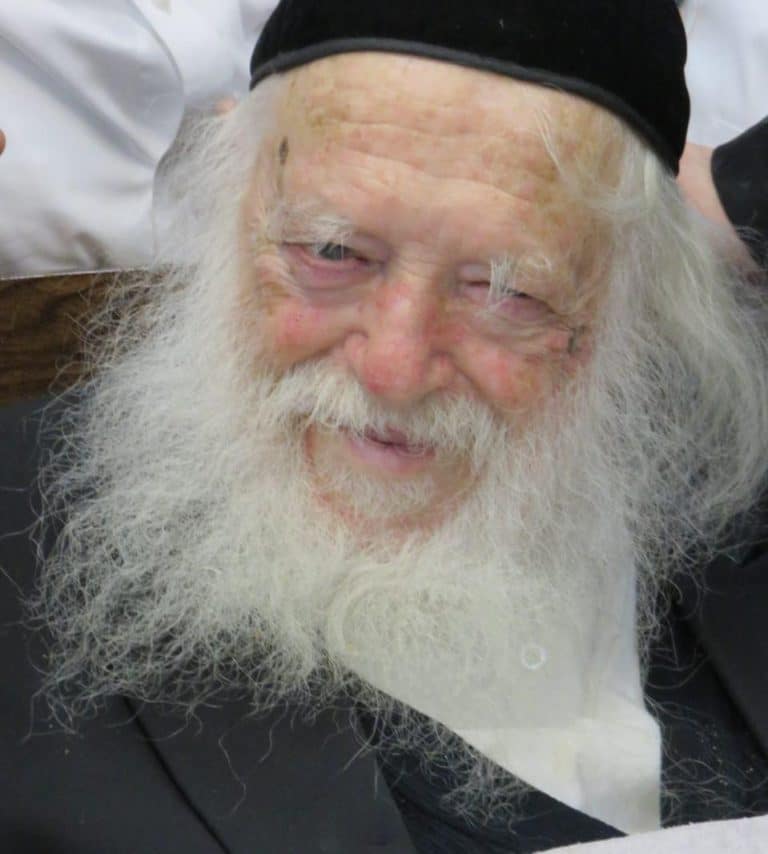
Hundreds of thousands gathered on Sunday at the funeral of Ultra-Orthodox Rabbi Chaim Kanievsky in one of the largest public gatherings in Israeli history.
An estimated 600K people attended the funeral of Rabbi Chaim Kanievsky in Bnei Brak, Israel. A tribute to a Jewish leader & Torah giant. He had zero followers on social media, but had a tremendous impact on the Jewish world for his humility & scholarship.pic.twitter.com/rxAeKGasCr
— Joel M. Petlin (@Joelmpetlin) March 20, 2022
Rabbi Kanievsky, who was one of the most revered figures among the world’s Haredi community and known as the “Prince of Torah,” died on Friday at age 94.
The largest funeral in Israel’s recent history. Rabbi Chaim Kanievsky, Venerated Talmudic Scholar, Dies at 94. pic.twitter.com/zqTXXi6FVN
— bennie777 (@bennie117) March 20, 2022
His funeral in Bnei Brak drew some 750,000 mourners in a country of only 9 million. Mourners filled nearby streets, balconies and rooftops – some even tried to climb the fence of the cemetery. Roads and highways around Bnei Brak and Tel Aviv were shut down, and in some areas, hundreds of schools stayed closed.
“I feel like my father died, so of course I should be at the funeral,” Hudi Rosen, a 21-year-old yeshiva student told the Jewish Telegraphic Agency.
@jewishunpacked As many as 750,000 mourners attended the funeral of a rabbi in Israel.
♬ original sound – Unpacked
Who was Rabbi Chaim Kanievsky?
Rabbi Kanievsky was born on January 8, 1928, in Pinsk, Poland – now Belarus – to a prestigious family in the Hasidic world. His father, Rabbi Yaakov Yisrael Kanievsky, and uncle, Rabbi Avraham Yeshayahu Karelitz, were both revered Hasidic sages known respectively as the Steipler Gaon and the Chazon Ish.
He moved to what became Israel before World War II — making him one of the last bridges between the European Haredi communities that were decimated during the Holocaust and the new Haredi world that emerged in Israel after the establishment of the Jewish state.
Rabbi Kanievsky was revered for his encyclopedic knowledge of Jewish law and scripture. According to his family, he studied Torah for up to 17 hours a day since the 1930s, reported the New York Times.
“He had neither material wealth, particularly good looks nor charisma, and he did not spend his life in search of the spotlight,” wrote the Jerusalem Post’s Herb Keinon.
“More than being a religious leader, he also represented the aspirational ideal for the haredi community. Kanievsky was a man who shunned material wealth and did not seek fame – but only wanted to learn, learn some more, and then continue learning.”
Why was he known as ‘the Prince of Torah’?
Kanievsky was known for adhering to a strict study schedule, reported the Times of Israel. Each year, among other things, he managed to study the entire Babylonian Talmud — a process that is more popularly completed over seven and a half years by learning one page a day.
He was so focused on Torah study that he was largely detached from the external world. According to the Jerusalem Post, he did not know what basketball was until he was asked a halachic question on whether it could be played on Shabbat.
Rabbi Kanievsky’s impact
Leaders in the Haredi community eulogized Kanievsky, remembering him as an “unparalleled” scholar and spiritual leader, according to the Times of Israel. In his lifetime he became the de facto leader of the Lithuanian Jews, an Ultra-Orthodox sect that has an estimated 1.1 million members in Israel.
Kanievsky was seen by many as a “gadol hador,” or giant of the generation, and his influence extended far beyond his community and Israel’s Haredi population. Kanievsky was seen by many as a true scholar of unparalleled religious knowledge. Every day hundreds of people would line up at his home for advice on anything from deeply spiritual matters to the mundane.
Rabbi Gershon Edelstein, 98, seen as the heir to Kanievsky’s leadership, said that there is no one who can parallel Kanievsky’s level of influence “here and anywhere else in the world.”
Israeli political leaders also paid tribute to the late rabbi. Prime Minister Naftali Bennett expressed “deep sorrow” over the passing of “one of the generation’s greats.”
“Despite his greatness with the Torah and [standing with] the public, the rabbi made sure to always receive everyone with an open heart and a light in his eyes. He was a true public leader,” the prime minister said.
Across the country, in the predominantly secular city of Haifa, Kanievsky was remembered at a national soccer game. Players on Beitar Jerusalem (an Israeli professional football club based in Jerusalem) wore black ribbons in memory of Rabbi Kanievsky at game against Hapoel Haifa.
This sign—mourning Rav Chaim Kanievsky—was unfurled at an Israeli soccer game. And I think that’s beautiful. pic.twitter.com/5pEgniAYSb
— David/Dovid Bashevkin (@DBashIdeas) March 20, 2022
Others shared on Twitter.
I had the privilege to meet with Rav Kanievsky z’l many times. I always was struck by his exceptional modesty, especially in light of how he was so admired and revered by his followers. A guiding light has been extinguished in this world, but he will continue to illuminate always pic.twitter.com/Vv2n9oX3K9
— David M Friedman (@DavidM_Friedman) March 20, 2022
My heart was pounding, my tears were already falling as I said tehilim for Sar HaTorah Maran Hagaon Harav Chaim Kanievsky the moment I received the message to pray because hatzalah was working on our Rebbe.
— Jamie Geller (@jamiegeller) March 20, 2022
All my kids gathered around me and we davened… https://t.co/g8WTI939BU
Originally Published Mar 21, 2022 06:09PM EDT


